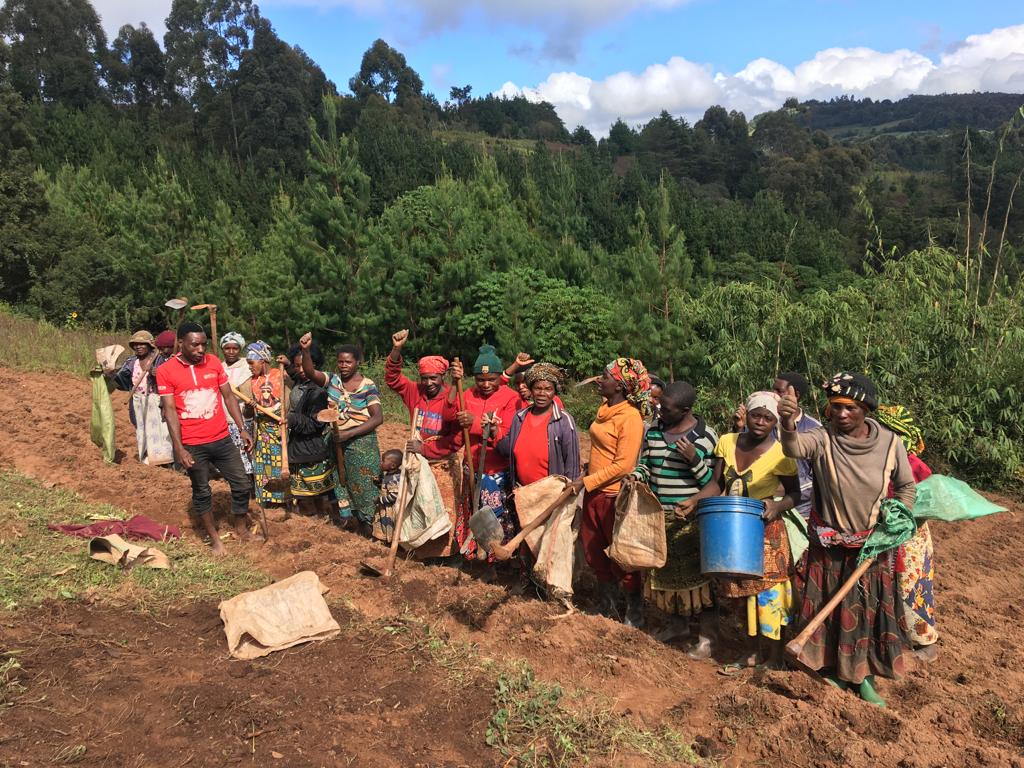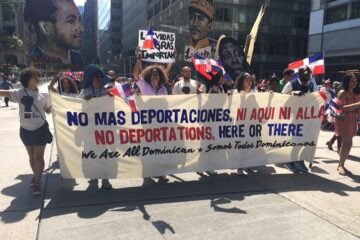The peasant organization National Network of Smallholder Farmers Groups Tanzania [Mtandao wa Vikundi vya Wakulima Tanzania – MVIWATA] is part of La Via Campesina and the World March of Women Tanzania chapter. The organization has been working on the issue of farmers and peasant rights in the country since 1993. We have talked to Theodora Pius, the Head of Program of MVIWATA and activist of the World March of Women in Tanzania, about the action of transnational companies and capitalist political agendas in the African continent and in her country.
About the organization, Theodora explains that “in 1993 they started the movement to join hands with other farmers across the country. Their challenges were especially on marketing and the policies that were being driven, that were not farmer friendly.” This year of 2023 MVIWATA is celebrating its 30 years anniversary.
Theodora also shared the solutions proposed by the peasantry in the country and the meaning of building grassroots peasant feminism. This interview, granted during the Dilemmas of Humanity International Conference, was produced collectively by Capire and Brasil de Fato. Read, watch and listen to this interview bellow:

Africa is used as an source of land and resources to be explored by international corporations. Can you tell us how this is affecting the continent, but most specifically, Tanzania?
You can not speak of the ongoing land grabs in Africa without taking account of what has been transpiring in the world. In what they call the global financial and food crisis of 2007, we could see the movement of capital from the west targeting agriculture and land. During that time, we had a number of ghost investment plans under the name of ‘biofuels’. Europe was in need of transforming [its energy matrix], and it needs another source of fuel, so a lot of land were being given to investors for them to plant those trees that could provide biofuel. Those projects failed, including the one in Tanzania. But also during that time, big agribusiness firms came to Africa looking for and taking land because Africa has an amazing big market for their products, be it pesticides, fertilizers, hybrid seeds, everything. They branded like Africa has a lot of arable land, a lot of vast and unoccupied land, so they called for everyone to come and invest in here.
One example is the Alliance for a Green Revolution in Africa (Agra). It is targeted to Africans, and it was part of the strategies to make sure that Africa remains at the mercy of the capital when it comes to our agriculture. They came with all this sort of fake promises, as we call it. They said that if Agra started to work we wouldn’t have food insecurity in Africa, we would increase productivity, and all sort of promises. This alliance was born in Europe, but they called it an initiative of Africans for Africans. It was just another disaster that came to consolidate what has already started. The coming of Agra facilitated for all those big projects.
Apart from there, now everyone in the world started to speak the language of climate change. So they shifted from “we came with the solution” to “we identify an alternative”, but they will speak based on what they want to speak, and not necessarily on the language of the people. Climate change is having a lot of effects on Africans, and then another move of land grab came in with Africa again being targeted. People are coming to Africa, taking native and natural forest for the carbon credits. Everyone is currently selling the so-called green bonds. Every day, new things happen, and they keep adding up to the already existing problems.
The government of Tanzania has recently started a new program called “Building a Better Tomorrow: a Youth and Women Initiative for Agribusiness”. This program has been denounced by the movements as a false solution for the problems of peasant youth. How is it menacing the peasants, and how the movement is organizing to fight it?
It’s also part of the techno-fixing solutions. They want to try to increase the participation of youth and women in agriculture, while everyone in the world currently speaks that women are the majority who works in agriculture. Also, we have already youth in agriculture. Perhaps what is needed is to see how we can facilitate access to land to this youth, how can they have the resources they need to go to farm, how could we facilitate the marketing of what they have produced. They exist, and they are in the rural areas already. So the government launched that Building a Better Tomorrow, and what it has done so far is just taking chunks of land and putting them together for the investors to come and take it. They also want to rechannel the production pattern of Tanzanians. Our agriculture is so rich of diversity, but that is not the recipe that Agra and others want. They want monoculture. In a nutshell, it’s just a land grab project.
What are the solutions and path towards justice, and democratizing food systems? How can it be based in agroecology and feminism? First we want food out of the market. The big agribusiness is looking at food as just merely a product that can be sold. That’s why they make a lot of cheap foods: they make sure that you don’t have option to choose what you want to eat. If you are speaking of democratizing the food system, you are speaking of putting mechanisms to make sure that farmers have freedom to choose what they want to grow, and also giving an assurance that whatever mechanism that they use in the food production, that that mechanism is safe. We shouldn’t bond farmers to contracts. They already have knowledge and mechanisms to make things work and to make sure that we all get enough food. Currently, we are speaking about to double or triple the productivity, but we are doubling that productivity at the expense of the lives of the farmers.
Democratizing food system means we are putting in mechanisms to make sure that consumers have the right to choose what they want to eat and to have safe food. It’s a power relation question, which means returning that power to the food producers. They need to have that power to decide on how safe they want to produce. The power of seeds and food fairs bind us as people of the same culture. Our lives, and whatever ways of organizing, should emphasize on seed sharing and whatever mechanism that we agree as people in the same community.
What has MVIWATA been doing to fight against these capitalist policies and agendas in the country?
The MVIWATA constitution of 2018 defines a small scale farmer as anyone who has a special attachment to the land. With that definition, indigenous people, farmers engaged in a crop farming, a small scale fisher folks, pastoralists, those that live in the forests, and other people that work in the rural areas form part of the membership. Currently, our major forms of struggles are to put effort to ensure that rural areas have basic social services, and to remove the connection of peasantry, or small scale farming, as a backward idea, rejecting that everyone needs to move towards large scale farming or agribusiness.
We challenge the existing food system through mechanisms such as agroecology and food sovereignty, ensuring that food production is centered towards the needs, the rights, and the culture of the people. We struggle to guarantee land rights of the peasant or small scale farmers, and also to make sure that enough food is being produced and distributed to everyone.
Theodora Pius

Another area that we are working upon is on gender justice. We’re looking at women and youth with the idea of peasant feminism that was initiated by La Via Campesina as a way to look holistically at the peasant women in the rural areas. We also work with the idea of economic justice. We have created farmer’s cooperatives, farmer owned financial institution, and solidarity economic mechanisms from farmers to farmers. Also, we have recently opened the agroecological market center in Morogoro.
How does the women from MVIWATA build peasant feminism?
Some few years back, the women of La Via Campesina started to ask themselves who they were, what are their struggles, and if is it true that their struggles as peasant women are the same as the other women struggles. So, as we were moving, we recognized the central role of women within MVIWATA. The early people that were moving across villages to tell people to join the organization were women. From there, the organization started to nurture the advantage that, from the beginning, we have women. We didn’t have to sit down and think of the ways and strategies to get women into movement.
But, what is it that we wanted as women? Everyone is speaking of feminism. What is feminism to us? And what does feminism looks like for us? Everyone maybe might be thinking that peasant women don’t know what is feminism, or even the word. “Do you know ‘feminism’ in Swahili?”, and they were like “what is that word? Haven’t heard of that”. Then some examples were given, and they said “but we are doing that in our villages, so we are feminists.” We asked “what is feminism to you?”, and they say “feminism to us means access to seeds, to land, to water, because currently water is being commoditized.”




